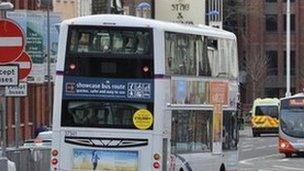Number of bus journeys in England fell 1.4% last year
- Published

There were 70 million fewer journeys on England's buses last year, a fall of 1.4%, according to new official data.
Stripping out London, where bus travel has been booming for years, the decline is far higher, at 2.5%.
About half of England's bus journeys are in London, where public funding is high, usage is healthy, and the industry is regulated.
However, campaigners have warned that in the rest of the country the situation is bleak.
Cuts to funding, and therefore services, plus inflation-busting fare rises (up 4.7% and higher in rural areas) are hitting people hard, they say.
Campaigners warn of the consequences for young people trying to find a job, but who do not have a car, and for older people who rely on buses to stay mobile.
There are about 4.6 billion passenger journeys on local buses every year in England, more than double the number of journeys on trains.
However, Tuesday's figures show that mileage on services that are subsidised by local authorities has fallen further, by 17% in the last two years.
It means that as government grants to local authorities have dwindled, so have the buses that need to be supported by the taxpayer.
Martin Abrams, from the Campaign for Better Transport, said the figures "show the dire consequences of government cuts to support for buses".
He said: "Year-on-year, we are seeing higher fares and fewer services. This is a false economy, preventing people from taking up job opportunities and hitting the poorest in society with massive hikes in travel costs."
'Vital'
Rachel Bromley, from the charity Sustrans, said: "Currently, a quarter of English households and almost two-thirds of job-seekers do not have access to a car.
"For these individuals affordable and reliable public transport is vital, particularly as two out of five jobseekers site lack of transport as a barrier to getting a job."
However, not all areas outside are seeing a decline. Bus services in Brighton, Oxfordshire and Poole have shown consistent growth. And Tuesday's government report also highlights a strong long-term link between a fall in bus use and more people getting cars.
Also, the government says some bus operators have stepped in to run services even after the subsidy has been cut.
Transport minister Norman Baker says his department has provided widespread support for services, including protecting the Bus Service Operators Grant since 2010 and providing new funding streams such as the Local Sustainable Transport Fund, the Better Bus initiative and the fourth round of the Green Bus Fund.
He told the BBC: "The government spends well over £1bn per year on concessionary travel and other support for buses every year.
"We are protecting bus subsidy and targeting it where it is needed most as well as making significant new funding available for bus improvements. The Department for Transport strongly supports bus travel. It is true that some councils have noticeably cut bus services, but others have not."
- Published20 September 2013
- Published19 September 2013